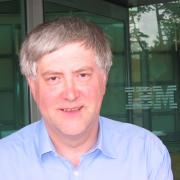Presentations

KVM is the primary hypervisor used in OpenStack deployments, combining two major open source projects to deliver open cloud computing. Expanding beyond its x86 roots, This presentation will review the architecture of both KVM and OpenStack, highlight the potential synergies and benefits, and discuss production OpenStack cloud deployments which use KVM.


2:00 - John Wetherill - Docker is not Enough: Container Orchestration with PaaS
2:10 - Sean O'Meara - Reusability Patterns for Configuration Management
2:20 - Matt Chung - DevOps for the Enterprise
2:30 - Corey Quinn - Weasel Your Way to the To
- 11:15- John Hautzinger - Operationalizing QA
- 11:25 - Dave Nielsen - From Containers to PaaS
- 11:35 - Danny McAllaster - Automated Web Application Testing
- 11:45 - Justin Mayer - Staying on Top of Linux System Security

If you use computers at all, you're probably adept at using a web brower. The BeagleBone Black comes with Linux, a web server, JavaScript I/O library and browser-based IDE installed out-of-the box. Learn how presentations and labs can be easily built-up using these tools to teach many analog and digital electronics concepts to individuals at all levels. Learn how to fork and extend the tutorial/curriculuum that comes shipped on the board and served up on Github pages. Use various HTML/JavaScript tools like jQuery and Processing.JS to create rapid visualizations of interactive data.
Distribution build systems are interesting beasts, complex and with many moving parts. In the past year, containers, Project Atomic, and other changes have forced a rapid evolution in how we consume source and deliver a distribution. This talk will take a look at the entire chain of building a distribution from start to finish, including some recent changes for cloud environments and containers.
"The next year will be the year of the Linux Desktop" - We have heard this so many times, yet the year didn't come. Why is that so? Are we doing something wrong? Even with the recent amazing news, that many gaming engines are turning to Linux and a few Linux-based gaming consoles are being released, there are still some problems which are frustrating for the end-user. In this talk, we will discuss what problems are there and how, as a community, we could solve them.

This presentation will describe the working life of a Linux kernel (or, more generally, open source) developer. It will show a newcomer what to expect of the development process and the community, and will help her get started with the existing rich set of resources for skill building and practice.
Linux is a robust and secure operating system with a rich array of applications. The Southern California Linux Expo is once again providing those who want to start using Linux an opportunity to learn how. SCALE will provide a one-day Installfest + basic system administration class on Saturday, February 21st, 2015.

Larger numbers of infected Linux hosts are being found day by day, yet the community seems largely oblivious. While Linux as a desktop platform has attracted much attention from criminals, Linux servers are a gold mine for abuse. Looking at data from SophosLabs this presentation will look through the most common types of malware on Linux, where it is most frequently found and what we can do to put additional barriers in place to prevent its spread.

What do you when your data starts from nothing, grows slowly, and never stops? How do you plan for the next level of hardware and software? Linux provides the kernel for every solution and what better place to learn to scale than SCaLE? A case study from the computation of -omics (connectome, genome, microbiome) will provide observations gained from 10 years of development.


